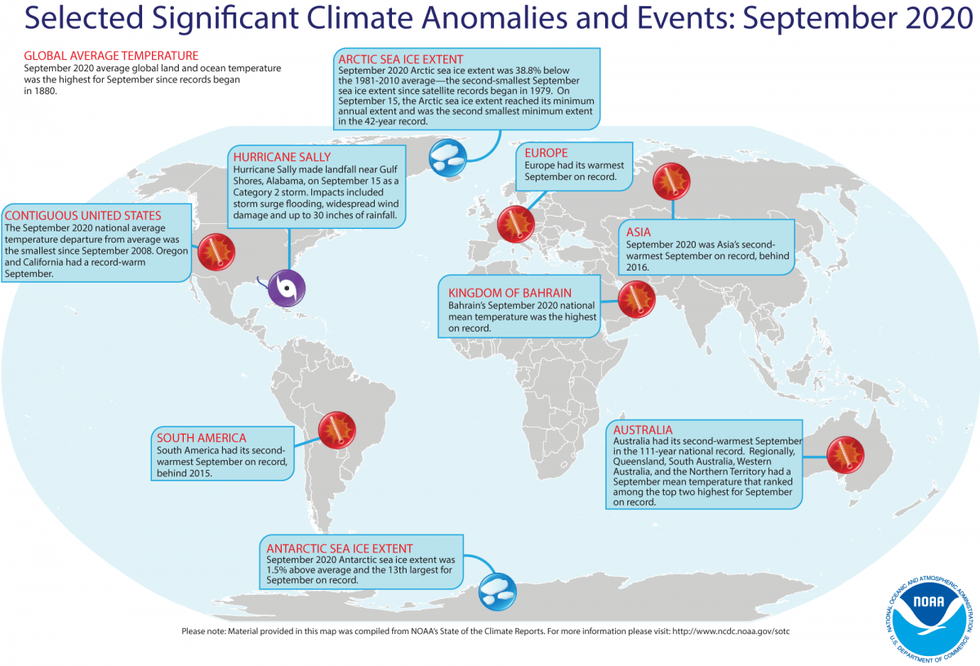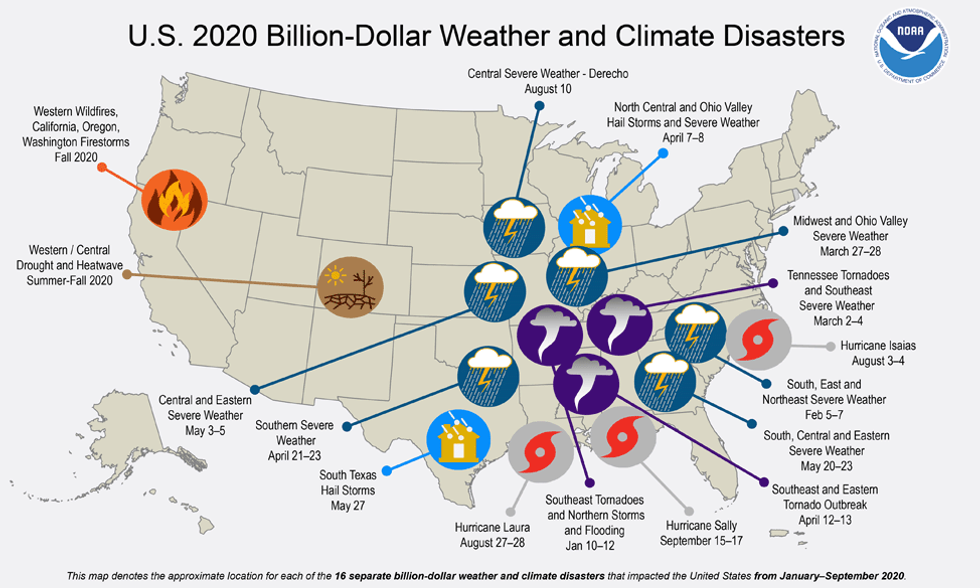
Firefighters perform structure protection against the Glass Fire in Napa County, California on Thursday, October 1, 2020. (Photo: Kent Nishimura/Los Angeles Times via Getty Images)
To donate by check, phone, or other method, see our More Ways to Give page.

Firefighters perform structure protection against the Glass Fire in Napa County, California on Thursday, October 1, 2020. (Photo: Kent Nishimura/Los Angeles Times via Getty Images)
As the climate crisis fuels devastating wildfires across the western United States and melts Arctic sea ice at an alarming rate, the National Oceanic and Atmospheric Administration announced Wednesday that Earth just experienced the hottest September on record and that 2020 is on pace to be one of the three hottest years on the books.
According to NOAA, "the 10 warmest Septembers have all occurred since 2005, with the seven warmest Septembers occurring in the last seven years."
"We've broken the climate system," tweeted meteorologist Eric Holthaus. "We are in a climate emergency."
\u201cNOAA and NASA data have just confirmed that September 2020 was the warmest September ever measured globally.\n\n2020 now has a 64% chance of being the warmest year in history.\n\nWe've broken the climate system. We are in a climate emergency.\u201d— Eric Holthaus (@Eric Holthaus) 1602687403
NOAA found that 2020 has a 65% chance of beating out 2016 as the warmest year on record, a 35% chance of being the second-warmest ever, and will almost certainly rank in the top three.
Climate scientists emphasized that this year's record-setting temperatures have been accompanied by an unprecedented wave of extreme weather events. A report published Tuesday by the United Nations Office for Disaster Risk Reduction examined the "staggering" increase in climate-related disasters, which doubled from 3,656 between 1980 and 1999 to 6,681 between 2000 and 2019, as Common Dreams reported.

Researchers at Yale found that eight weather-related disasters causing $1 billion or more in damage occurred across the world in September alone, bringing the annual total thus far to 35. There were 40 such events in both 2018 and 2019.
With 16 extreme weather events so far in 2020, the U.S. has already tied its record for most billion-dollar weather disasters in a single year.

NOAA's findings echo a European Union study published one week ago. As Common Dreams reported, one of the EU climate scientists who contributed to the analysis noted that the planet "will carry on warming if greenhouse gas emissions continue at the rate they are at the moment."
"It is baffling that we willingly and knowingly continue to sow the seeds of our own destruction," the U.N. report stated, "despite the science and evidence that we are turning our only home into an uninhabitable hell for millions of people."
Trump and Musk are on an unconstitutional rampage, aiming for virtually every corner of the federal government. These two right-wing billionaires are targeting nurses, scientists, teachers, daycare providers, judges, veterans, air traffic controllers, and nuclear safety inspectors. No one is safe. The food stamps program, Social Security, Medicare, and Medicaid are next. It’s an unprecedented disaster and a five-alarm fire, but there will be a reckoning. The people did not vote for this. The American people do not want this dystopian hellscape that hides behind claims of “efficiency.” Still, in reality, it is all a giveaway to corporate interests and the libertarian dreams of far-right oligarchs like Musk. Common Dreams is playing a vital role by reporting day and night on this orgy of corruption and greed, as well as what everyday people can do to organize and fight back. As a people-powered nonprofit news outlet, we cover issues the corporate media never will, but we can only continue with our readers’ support. |
As the climate crisis fuels devastating wildfires across the western United States and melts Arctic sea ice at an alarming rate, the National Oceanic and Atmospheric Administration announced Wednesday that Earth just experienced the hottest September on record and that 2020 is on pace to be one of the three hottest years on the books.
According to NOAA, "the 10 warmest Septembers have all occurred since 2005, with the seven warmest Septembers occurring in the last seven years."
"We've broken the climate system," tweeted meteorologist Eric Holthaus. "We are in a climate emergency."
\u201cNOAA and NASA data have just confirmed that September 2020 was the warmest September ever measured globally.\n\n2020 now has a 64% chance of being the warmest year in history.\n\nWe've broken the climate system. We are in a climate emergency.\u201d— Eric Holthaus (@Eric Holthaus) 1602687403
NOAA found that 2020 has a 65% chance of beating out 2016 as the warmest year on record, a 35% chance of being the second-warmest ever, and will almost certainly rank in the top three.
Climate scientists emphasized that this year's record-setting temperatures have been accompanied by an unprecedented wave of extreme weather events. A report published Tuesday by the United Nations Office for Disaster Risk Reduction examined the "staggering" increase in climate-related disasters, which doubled from 3,656 between 1980 and 1999 to 6,681 between 2000 and 2019, as Common Dreams reported.

Researchers at Yale found that eight weather-related disasters causing $1 billion or more in damage occurred across the world in September alone, bringing the annual total thus far to 35. There were 40 such events in both 2018 and 2019.
With 16 extreme weather events so far in 2020, the U.S. has already tied its record for most billion-dollar weather disasters in a single year.

NOAA's findings echo a European Union study published one week ago. As Common Dreams reported, one of the EU climate scientists who contributed to the analysis noted that the planet "will carry on warming if greenhouse gas emissions continue at the rate they are at the moment."
"It is baffling that we willingly and knowingly continue to sow the seeds of our own destruction," the U.N. report stated, "despite the science and evidence that we are turning our only home into an uninhabitable hell for millions of people."
As the climate crisis fuels devastating wildfires across the western United States and melts Arctic sea ice at an alarming rate, the National Oceanic and Atmospheric Administration announced Wednesday that Earth just experienced the hottest September on record and that 2020 is on pace to be one of the three hottest years on the books.
According to NOAA, "the 10 warmest Septembers have all occurred since 2005, with the seven warmest Septembers occurring in the last seven years."
"We've broken the climate system," tweeted meteorologist Eric Holthaus. "We are in a climate emergency."
\u201cNOAA and NASA data have just confirmed that September 2020 was the warmest September ever measured globally.\n\n2020 now has a 64% chance of being the warmest year in history.\n\nWe've broken the climate system. We are in a climate emergency.\u201d— Eric Holthaus (@Eric Holthaus) 1602687403
NOAA found that 2020 has a 65% chance of beating out 2016 as the warmest year on record, a 35% chance of being the second-warmest ever, and will almost certainly rank in the top three.
Climate scientists emphasized that this year's record-setting temperatures have been accompanied by an unprecedented wave of extreme weather events. A report published Tuesday by the United Nations Office for Disaster Risk Reduction examined the "staggering" increase in climate-related disasters, which doubled from 3,656 between 1980 and 1999 to 6,681 between 2000 and 2019, as Common Dreams reported.

Researchers at Yale found that eight weather-related disasters causing $1 billion or more in damage occurred across the world in September alone, bringing the annual total thus far to 35. There were 40 such events in both 2018 and 2019.
With 16 extreme weather events so far in 2020, the U.S. has already tied its record for most billion-dollar weather disasters in a single year.

NOAA's findings echo a European Union study published one week ago. As Common Dreams reported, one of the EU climate scientists who contributed to the analysis noted that the planet "will carry on warming if greenhouse gas emissions continue at the rate they are at the moment."
"It is baffling that we willingly and knowingly continue to sow the seeds of our own destruction," the U.N. report stated, "despite the science and evidence that we are turning our only home into an uninhabitable hell for millions of people."